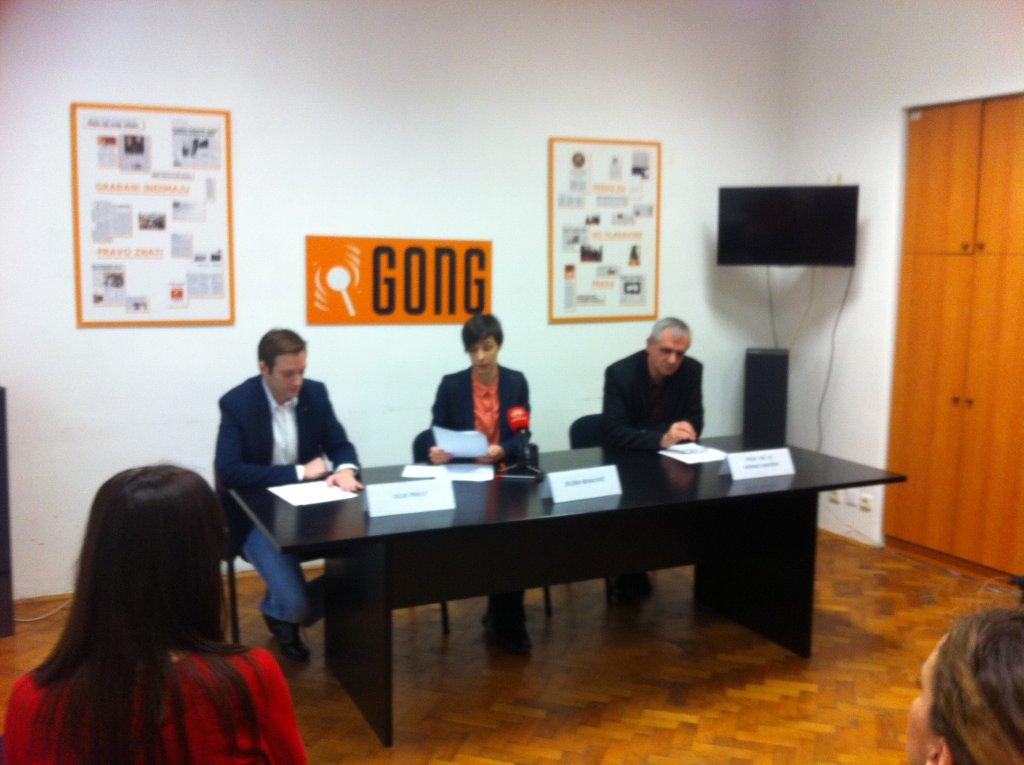Instead of electing independent, non-partisan experts with experience in administrating elections to the State Electoral Commission (SEC) in order to make it a truly proactive body, the Parliament has merely voted in “fresh” not-entirely-partisan persons, missing a crucial opportunity to strengthen the role and public image of the SEC – this was the message sent out by GONG on the occasion of the election of new SEC members through an agreement between the two largest parties.
“The public never had the chance to hear and see who the persons proposed by the parties are, meaning that an opportunity to legitimize experts who would truly be suitable to the task was missed. The practice of candidates’ CVs being made publicly available and holding hearings of candidates before the Committee on the Constitution, Standing Orders and Political System – as applied to prospective Justices of the Constitutional Court, Ombudsman and Information Commissioner – was unfortunately not implemented”, stated Nenad Zakošek, GONG member and professor at the Faculty of Political Science in Zagreb.
SEC minimalism and conservatism instead of proactivity
“What we got are people who are not experts but are distinguished mainly by their party memberships and affiliations, leading to a passive role being guaranteed for the SEC. I do not think this is incidental, but that a passive institution has been designed deliberately, so that it would assume a conservative and minimalist role”, warned Zakošek, reminding that GONG has “recently proposed amendments to the Act on the State Electoral Commission, but found no political will for these propositions to be heard out”.
The Parliament had elected Ana Lovrin and Vesna Fabijančić to be vice-presidents of the SEC and Emil Tomljanović, Slaven Hojski and Josip Vresk as members, with the latter now starting to serve his second eight-year term. Although the new SEC members are no longer party members, Lovrin is HDZ’s former Minister of Justice and, just as Tomljanović, former HDZ MP; Fabijančić comes to the SEC from the Parliament where she was SDP’s MP; Vresk was HSS’s MP and Hojski was the Secretary of the Parliament.
After eight years, Vice-Presidents Zdravka Čufar Šarić and Aleksandra Jozić Ileković and members Zorislav Ham and Davor Orlović are leaving the SEC. The SEC has a total of nine members – a President who serves as the Chief Justice of the Supreme Court, four Vice-Presidents, two of which are elected by the Supreme Court and two who are elected by the Parliament, as are the four members. But, instead of opening elections to those who administrate and observe them, the new SEC membership has been elected through a closed-off procedure away from the public eye, the same as back in 2007 when the SEC was first established as a permanent body.
New SEC members in permanent conflict of interest
“These appointments gave us SEC members who are in a state of perpetual conflict of interest by virtue of their party connections, meaning that the very choice of members has disrupted public trust in the SEC. The Supreme Court Justices remain the only guarantee of this institution’s autonomy and independence, as there is no other sign of proactivity in resolving the problems that are stemming from an incomplete legal framework”, warned GONG’s Duje Prkut, explaining that – just as an example of the framework – non-party lists in the upcoming local elections will not be allowed seats on electoral committees.
The assignments given the SEC by the Act on the SEC and the Political Party and Electoral Campaign Financing Act demonstrate how important it is to “supervise the supervisor”. The SEC’s authority includes the responsibility for administrating elections, overseeing political party and campaign financing, systematically educating electoral committees and encouraging various voter categories to participate. The SEC is also charged with actively improving electoral legislation and introducing innovations, using the electoral commissions in the UK and Canada as the models to emulate.
How can the SEC prevent new cases like the Fimi Media?
Which of the above is being carried out by the SEC? When asking this question, one should have in mind the fact that the SEC never lived up to the expectations set before it during its first term as a permanent body, as evidenced by GONG’s 2010 report on the work of the SEC. In addition, taxpayers have provided almost eight million kuna – twice the Information Commissioner’s or GONG’s entire annual budget, with elections being only a part of one of GONG’s four programmes – for the Commission’s overhead alone, not including the expenses of conducting any elections.
Despite these outlays, in previous years it was GONG and Transparency International Croatia – not the SEC –monitoring not only the political parties’ and candidates’ financial reports, but also the numbers of billboards, radio and TV appearances and party rallies, comparing the state in the field with what was being reported. This is exactly why it is necessary that the SEC’s composition be moved away from lawyers only and open to other relevant professions such as political science, sociology, economics, journalism…
“We expect the SEC to start carrying out its tasks to the fullest and to justify its budgetary funds to the citizens. We want the certainty that there will be no new cases like the Fimi Media or that they will at least be recognized early on – it is up to us as citizens, civil society organizations and media to constantly remind the SEC of these tasks. The Ministry of Public Administration is to propose legal amendments to improve the state of affairs, while SDP and HDZ are to give some thought on what their legacy is and how they can fix the mistakes made so far”, stated GONG’s Jelena Berković, going on to conclude that “an important question in future election campaigns needs to be whether parties and candidates will propose fixes for the SEC so that the institution can finally cross over from the 20th to the 21st century”.
